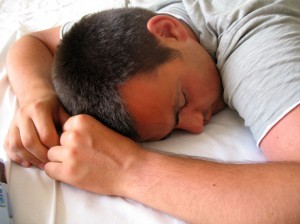 Did you know that over 60% of the American population knows that they need more sleep? This goal is important to them. But only half of them accomplish their goal. On average, we get between six and seven hours of sleep a night.
Did you know that over 60% of the American population knows that they need more sleep? This goal is important to them. But only half of them accomplish their goal. On average, we get between six and seven hours of sleep a night.
We need between eight and ten hours on any given night.
That means that Americans are a nation of sleep-deprived zombies.
There are a lot of reasons why people lose sleep:
We want to get more done. We want to spend time with friends or family. Just one more television program. And the end result is that we might get more done, once. After that we’re cranky, tired, unable to focus, and less productive. Friends and family don’t want to spend time with us because we’re irritable and tend to snap at the smallest slight.
But the single most commonly blamed reason for not getting enough sleep on a nightly basis is stress. According to the American Psychological Association survey, 43% of people say they lie awake at night feeling stressed. We have more tasks than we have time for and because we don’t know how to say no at the proper times, we give up hours of sleep worrying about the things that did not get done.
In order to allow our minds to relax, even with things left undone, learn how to reduce your sensations of stress.
First, write a list of all the things that need to be done. By writing it down, we allow our mind to think, “OK, someone’s taken care of it, I can rest now.” Not everyone finds it as easy as this, but writing notes or lists is one way to put your mind at ease.
Eat and drink sleep-inducing foods and beverages. Warm milk, chamomile tea, and cherry juice have all been reported to aid in wooing slumber. Eating almonds for their magnesium, or cheese and crackers for the calcium can also help.
Keep all electronics out of the bedroom. LCD light actually interferes with the body’s production of melatonin. Melatonin is the hormone that makes us sleep. Some people even resort to taking melatonin supplements to help them get improved shut-eye.
If you are awake for longer than 30 minutes, it is often better to get up and do something quiet and gentle. Don’t turn on bright lights, but even reading for a few minutes can take your mind off the fact that you can’t sleep enough to help you relax enough to finally drop off. Just don’t do work when you wake up. Have a book of essays or poetry on hand for those nights.
Follow this advice from Synergy Healthcare: Have a healthy sleep routine and stick to it. Don’t allow anyone to penetrate your sleep boundaries. You know when you feel sleepy. You don’t have to wait until your partner feels like going to bed before you do. You are the one who will pay the price for not getting enough sleep.